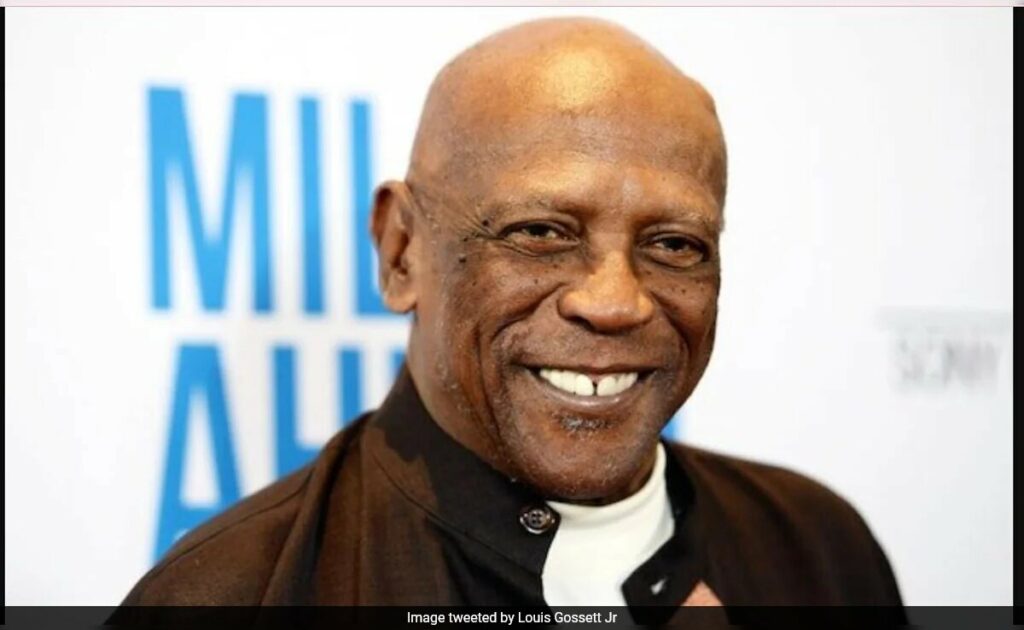Louis Gossett Jr, who won an Emmy for Roots and an Academy Award for An Officer and a Gentleman, has passed away. He was 87, as per The Hollywood Reporter. The actor died at a rehabilitation centre in Santa Monica, California. Although Gossett’s exact cause of death is unknown, he had recently battled respiratory illness and prostate cancer.
In a statement obtained by The Hollywood Reporter, his family said, “It is with our heartfelt regret to confirm our beloved father passed away this morning. We would like to thank everyone for their condolences at this time. Please respect the family’s privacy during this difficult time.”
Gossett was menacing in a variety of tough roles, most notably in Taylor Hackford’s Officer and a Gentleman (1982), where he played Gunnery Sgt. Emil Foley and rode Richard Gere’s character mercilessly (but for his own good) at an officer candidate school before engaging in an unforgettable martial arts duel. Gossett had a sleek, bald pate and an athlete’s physique.
He was the second Black man to win an acting Oscar, following Sidney Poitier in 1964.
For the role, the 6-foot-4 Gossett trained for 30 days at the Marine Corps Recruitment Division, an adjunct of Camp Pendleton north of San Diego. “I knew I had to put myself through at least some degree of this all-encompassing transformation,” Gossett wrote in his 2010 biography, An Actor and a Gentleman.
Gossett began his Hollywood career in 1959 as George Murchison in the original Broadway production of Lorraine Hansberry’s familial tragedy A Raisin in the Sun. He later co-starred alongside Poitier and Ruby Dee in Daniel Petrie’s 1961 Columbia film adaptation.
His first major taste of national fame came from his eloquent performance in the eight-part ABC miniseries Roots, where he played Fiddler, an elderly slave who taught a young Kunta Kinte (LeVar Burton) to speak English. Eighty-five per cent of Americans watched at least some of Roots, and in January 1977, the show’s conclusion drew in over 100 million people.
“All the top African-American actors were asked, and I begged to be in there,” Gossett once said. “I got the best role, I think. It was wonderful.”
According to The Hollywood Reporter, Gossett also starred in the critically acclaimed telefilm Sadat (1983), in which he played the assassinated Egyptian leader (Sadat’s widow, Jehan, personally chose him for the part), and he portrayed a baseball immortal in Don’t Look Back: The Story of Leroy Satchel Paige in a 1981 telefilm.
During his 60-year-plus career, Gossett excelled in a number of non-stereotypical racial roles, playing a hospital chief of staff on the 1979 ABC series The Lazarus Syndrome and the title character Gideon Oliver, an anthropology professor, on a 1989 set of ABC Mystery Movies.
Gossett was born on May 27, 1936, in the melting pot of Brooklyn, the son of a porter (who was adopted and raised by an Italian family) and a maid. At Abraham Lincoln High School, he was class president and starred on the baseball, track and basketball teams; later, he would be invited to the New York Knicks’ rookie camp.
Gossett became interested in acting after missing one season of high school basketball due to a leg injury. His English instructor suggested him to the makers of the 1953 Broadway production Take a Giant Step. After defeating over 400 other candidates to get the main part at the age of 17, he was awarded the Donaldson Award for best rookie of the year.
Gossett joined James Dean as a friend at the Actors Studio in New York after accepting a dramatics scholarship to NYU. He made his movie debut in 1957 on the NBC anthology series The Big Story.
In 1964, he, Lola Falana and Mae Barnes sang in the cast of America, Be Seated, a “modern minstrel show” that was produced by Mike Todd Jr. and played at the 1964 World’s Fair in New York.
Two years later, he co-wrote the antiwar song Handsome Johnny for Richie Havens’ first album, a tune the folk legend performed as the opening act at Woodstock three years later.
Gossett went on to play an angry man living in a run-down apartment building in Hal Ashby’s The Landlord (1970), a con artist opposite James Garner in the slavery-era Skin Game (1971), a drug-dealing cutthroat in The Deep (1977), a headmaster in Toy Soldiers (1991) and a down-and-out boxer in Diggstown (1992), as per The Hollywood Reporter.
(Except for the headline, this story has not been edited by NDTV staff and is published from a syndicated feed.)
